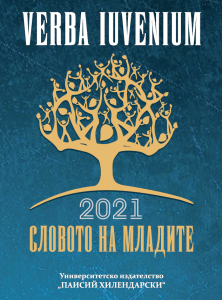Contents of Issue 3
Foreword
I. Linguistics
Gergana Georgieva
Velitchka Ilieva
Three Lead Amulets from the Period of the First Bulgarian Empire
Diana Markova
Vasil Stamenov
The Grammatical Morpheme –h-/-sh– in Bulgarian (Historical Notes)
Marina Dimitrova
Stefka Aleksandrova
Politeness in Bulgarian Speech Communication
Zhaneta Andreeva
The Manipulative Aspect of Cognitive Metaphors in Contemporary Bulgarian Political Speeche
Nataliya Matseva
Radoslava Koleva
Fragments of the Language Depiction of a Certain Type of Crime in Bulgarian and Polish
Sema Kutsarova
The Negative Character Traits, Found in the Verbal Derivatives in Turkish and Bulgarian
Simeon Mihalkov
Punning as a Word-forming Method in Bulgarian and Greek Youth Slang
Yuliyan Zhelyazkov
Isidora Jakšić Perović
From Ferdinand de Saussure to Noam Chomsky
Ivan Stoev
About the Phonetic Special Feature of Chinese Dialcets
Nataša A. Spasić
Teaching Serbian as a Foreign Language Using Web Tools
Slaveyah Goranova
Alyona Rutkovska
Language of Culture and Cultural Speech
II. Literary Studies
Nikolay Genov
Phantomology – a Marginalized Project and Its Benefits to Literary Studies
Maksym Rutkovskiy
Fiction in Interactive English Classes as a Means of Educational Space Humanization
Lilia Trifonova
Oscar Wilde’s New Salome. The Fatalism of the Dance
Daniel Kamenov
The Authenticity of Thomas Wolfe’s Autobiographical Hero Through the Lens of Heideggerian Ontology
Joanna Neykova
The Book of Illusions: on a Maurice Blanchot and Paul Auster Connection
Francheska Zemyarska
Yourcenar’s Imaginary Father: Old Melancholy and Charming Reticence
Aleksandra Stojanovic
The Remains of the American Dream in Cormac Mccarthy’s The Road
Vladimir Mitev
Literature as a Means of Social Change in Iran Before the Islamic Revolution
Nedyalko Zhelev
XX Century in Retrospection – Günter Grass and Patrik Ouředník as Chroniclers of the Last Century
Maria Hanzarova
The Excessive Ingenuity of Chatski. The Absence of the Characterfrom “Here” and “Now”
Zoya Ivanova
Marina Tsvetaeva – Reconstruction Through Memory
Milena Dimova
The Great Sorrow of the Little Man in the Works of Yordan Yovkov and Sergey Dovlatov
Ivana Vitanova
The Road of and the Road to ‘the Lost Child’ in Lyuben Karavelov’s Novels ‘Turkish Pasha’ and ‘Neda’
Rositsa Vasileva
The Military Stories of Yordan Yovkov and Yordan Valchev
Stefka Filipova-Mertzimeki
Vanessa Andonova
Boris Iliev
